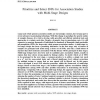Free Online Productivity Tools
i2Speak
i2Symbol
i2OCR
iTex2Img
iWeb2Print
iWeb2Shot
i2Type
iPdf2Split
iPdf2Merge
i2Bopomofo
i2Arabic
i2Style
i2Image
i2PDF
iLatex2Rtf
Sci2ools
JCB
2008
2008
Prioritize and Select SNPs for Association Studies with Multi-Stage Designs
Large-scale whole genome association studies are increasingly common, due in large part to recent advances in genotyping technology. With this change in paradigm for genetic studies of complex diseases, it is vital to develop valid, powerful, and efficient statistical tools and approaches to evaluate such data. Despite a dramatic drop in genotyping costs, it is still expensive to genotype thousands of individuals for hundreds of thousands single nucleotide polymorphisms (SNPs) for large-scale whole genome association studies. A multi-stage (or two-stage) design has been a promising alternative: in the first stage, only a fraction of samples are genotyped and tested using a dense set of SNPs, and only a small subset of markers that show moderate associations with the disease will be genotyped in later stages. Multi-stage designs have also been used in candidate gene association studies, usually in regions that have shown strong signals by linkage studies. To decide which set of SNPs to...
| Added | 13 Dec 2010 |
| Updated | 13 Dec 2010 |
| Type | Journal |
| Year | 2008 |
| Where | JCB |
| Authors | Jing Li |
Comments (0)

